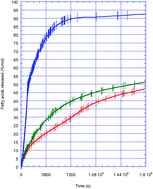The in vitro digestion of β-lactoglobulin stabilized emulsions rich in the n-3 polyunsaturated fatty acids, eicosapentaenoic acid (EPA) and docosahexaenoic acid (DHA), was studied using several physicochemical techniques. Artificial media for the mouth, stomach and small intestine were used in a sequential static in vitro digestion method. Different sizing techniques were compared to follow the droplet size during the digestion steps, including diffusing wave spectroscopy (DWS) which allowed direct measurements on undiluted emulsions. Titration of fatty acids confirmed that the digestion of such emulsified fish oils is partial. The study of the digestion at the oil–water interface using tensiometry revealed specific affinities between lipids and proteins. These could explain the emulsion and the single droplet lipolysis. Nevertheless, by comparing our results to a previous study on fish oil lipolysis, we identified two other important factors. Those were the aqueous solubility and the rate of hydrolysis of the individual fatty acids, the emulsion with the most soluble and hydrolysable ones being digested more quickly.

